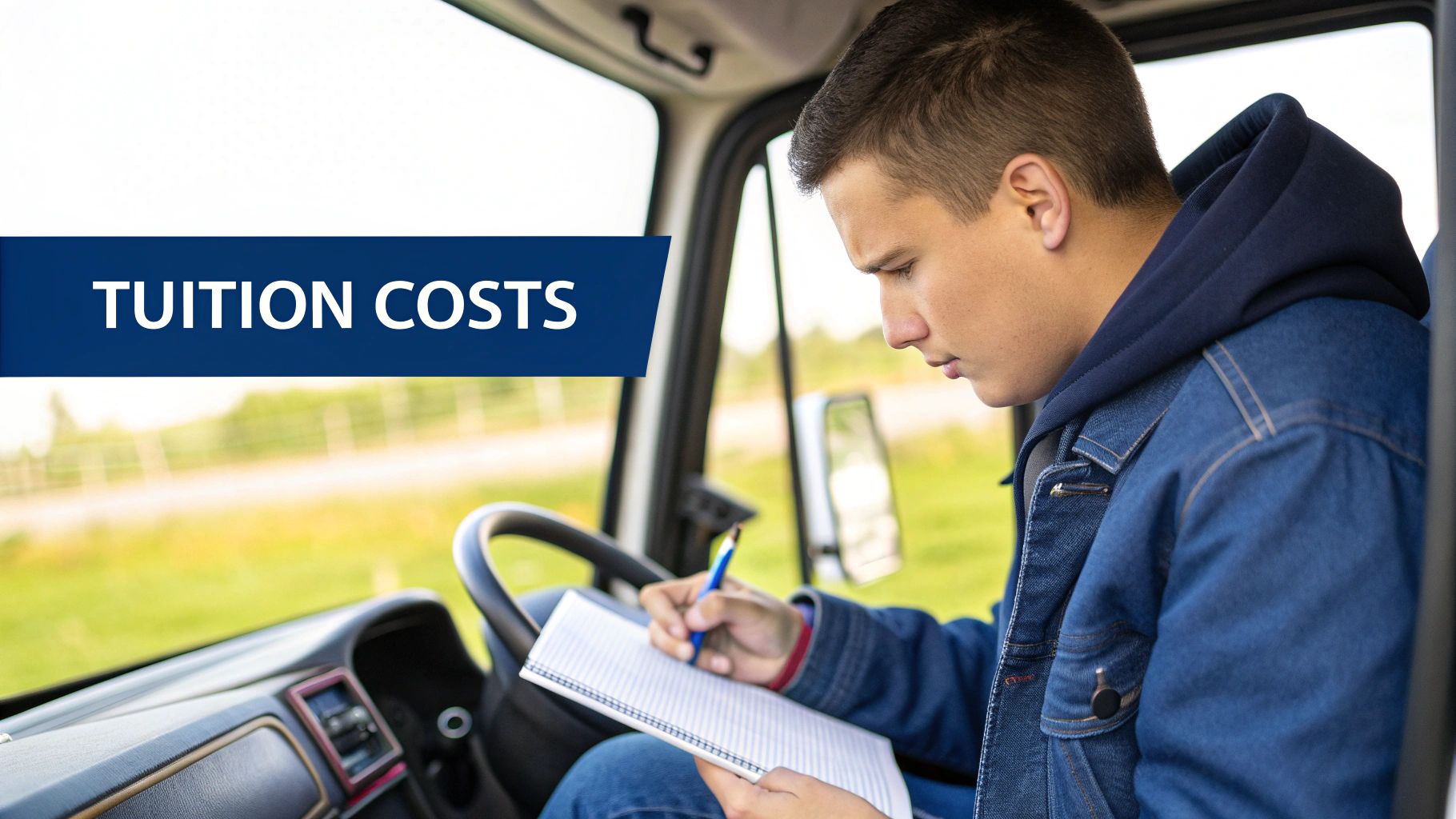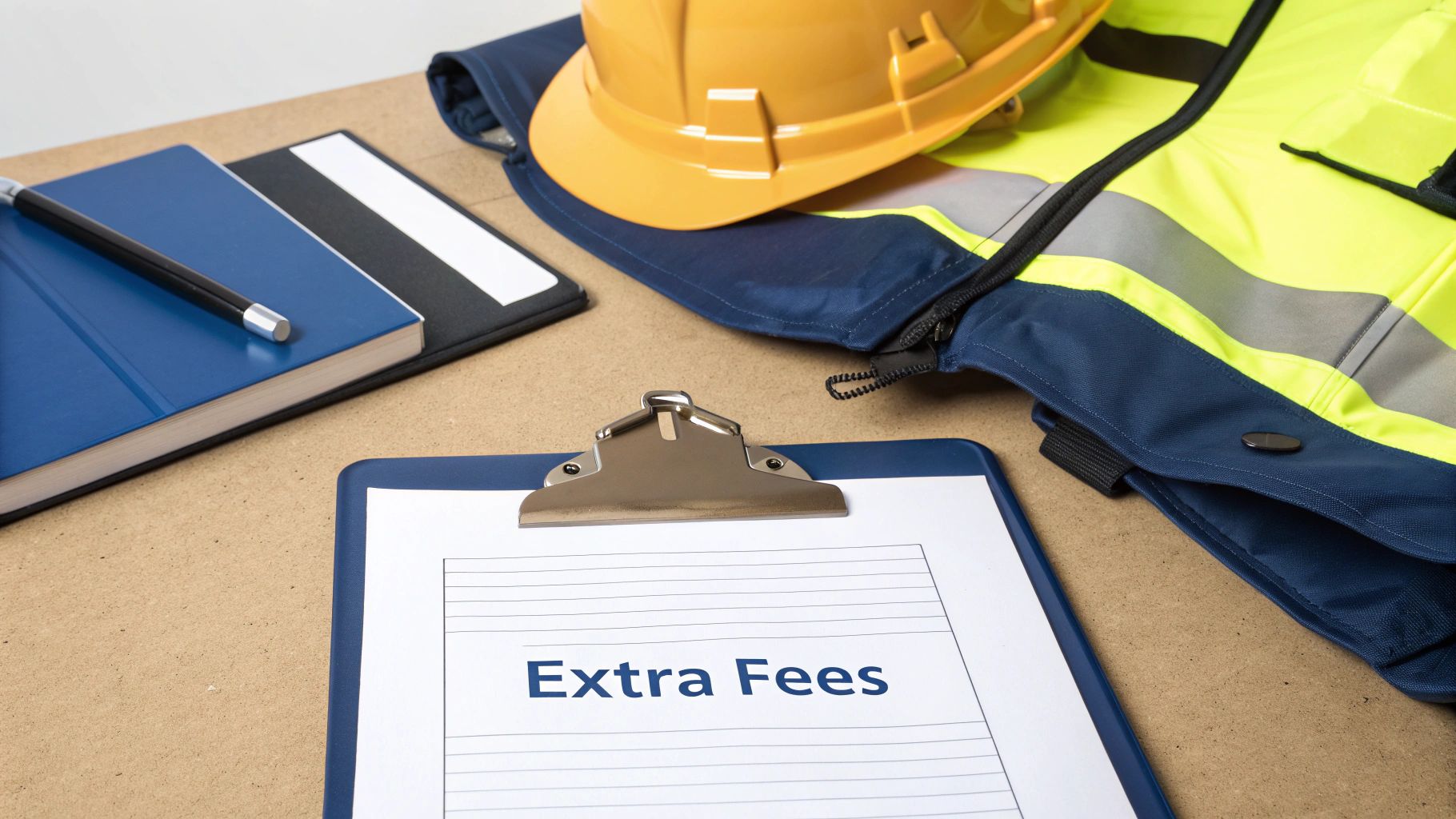How Much Does CDL School Cost? | Find Out Today!
Alright, let's get straight to it: how much does CDL school actually cost? You should plan on spending anywhere from $4,000 to $12,000 for your training. That’s a big range. The final price really comes down to the school you pick, where it's located, and the license you're going for.
CDL School Cost in 2025

Thinking about getting your CDL is a great first step toward a solid career. But before you get behind the wheel, you need to figure out the cost. There's no single price tag for CDL school. It's important to know what makes the price go up or down.
The final bill depends on a few key things. The type of school you pick is the biggest one. Private schools often cost more but might get you into a truck faster. Community colleges are usually cheaper, but you might have to wait to get in.
Where you live matters, too. Just like gas, training costs more in some states. This is why you see such a big price range when you start looking.
What the Numbers Look Like
Let's dig into that price range. A good CDL program that gets you ready for the real world usually has about 160 hours of training. This time is split between classroom learning and, most importantly, driving time. For this kind of training, the cost is usually between $4,000 and $12,000.
As a rule, community college programs will be on the lower end of that price range. Private schools, which often have better schedules and help you find a job, tend to cost more. You can get more details on how these costs add up by checking out this guide from Schneider.
To give you a clearer picture, here’s a simple table. It breaks down what you can expect to pay for your CDL training based on the school type.
Estimated CDL School Cost Ranges
This table shows the typical low, average, and high costs for CDL training programs across the U.S.
Cost LevelEstimated Price RangeCommon School TypeLow-End$3,000 - $6,000Community College or State-Funded ProgramAverage$6,000 - $10,000Private Truck Driving School or Company-Sponsored ProgramHigh-End$10,000 - $12,000+Advanced/Specialized Private School with High Job Placement
Think of this table as a starting point. It helps you see where different schools land on the price scale. This way, you can start budgeting and decide which path is right for your new career.
What Your Money Actually Covers in CDL School

When you see a price for CDL school, you’re looking at more than just a classroom seat. That number is a package deal. It’s meant to take you from a total beginner to a pro ready for the road. It's like buying a new truck—the price isn't just for the frame. It includes the engine, tires, and everything you need to get rolling.
The biggest piece of that cost is your tuition. This covers your learning, from classroom time on rules and safety to getting your logbook right.
But the real value is your time behind the wheel. Tuition pays for the fuel, insurance, and wear and tear on the practice trucks. This is the equipment you'll use to learn how to handle a big rig.
The Breakdown of Core Training Costs
Tuition is the main thing, but it’s just one part. Most schools bundle several key costs into their program price. This makes things simple for you.
Here’s a look at what that price usually includes:
- Classroom Instruction: This is your foundation. You'll learn federal and state laws, how to inspect your vehicle, and everything you need to pass the written permit test.
- Behind-the-Wheel Training: This is where you put what you learned into action. You'll get hands-on practice shifting, backing up, and hooking up trailers with a pro right beside you.
- Use of Equipment: Schools provide the trucks and trailers for your training and your final skills test. This gear is expensive to own and maintain, and that cost is part of your tuition.
- Admin Fees: Schools have costs to run the business. These fees help cover your sign-up, paperwork, and other daily operations.
Fees You'll Pay Outside of Tuition
On top of the main school fees, you’ll need to budget for a few extra costs. You'll handle these yourself, often before you even start class.
Think of them like the title and registration fees for a car—they’re separate but necessary. You'll likely pay these directly to the DMV or a medical clinic.
Key Takeaway: Always budget for these extra costs. They can add up to a few hundred dollars. You don’t want any surprises holding up your training.
Here are the common costs you'll need to cover yourself:
- DOT Medical Exam: Before you get your permit, a doctor has to check that you're healthy enough to drive. Expect this to cost between $100 and $200.
- Drug Screening: A drug test is required. It's usually done at the same time as your medical exam.
- Commercial Learner’s Permit (CLP): You’ll pay a fee to your state's DMV to take the written tests and get your permit. This can be up to $90, depending on where you live.
- CDL Skills Test Fee: Some schools include your first road test in their tuition. But if you need to retake it, you will have to pay extra each time.
Some schools, like community colleges, list these costs very clearly. For instance, you might see a program with tuition around $720, course fees of about $1,000, and a $70 exam fee. On these cheaper paths, the total can stay under $2,000 (not counting small personal items). You can see a detailed cost breakdown to get a better feel for how these programs list their costs.
Private Schools vs Community Colleges
When you look into CDL school costs, you’ll find two main options: private truck driving schools or community college programs. Both get you a CDL license. But they take very different paths to get there.
Think of a private school like an express shuttle. It's fast, direct, and focused on getting you licensed as quickly as possible. A community college is more like the city bus. It's a lot cheaper and reliable, but it runs on a set schedule and makes more stops.
The path you choose will affect your wallet, your schedule, and even your first job.
The Private School Route
Private CDL schools are built for one thing: getting people licensed and in a truck. Fast. Because they are so focused, they are almost always the more expensive option. Tuition is often in the $5,000 to $10,000 range.
So, what does that higher price get you?
- Speed: Most private schools offer intense, full-time programs. They can get you ready for your CDL exam in just 3 to 6 weeks. This is a huge plus if you want to start earning money fast.
- Job Placement Help: These schools know trucking. They have good connections with big carriers, and recruiters often visit classes. Their success depends on getting you a job.
- Flexible Schedules: Many offer night and weekend classes. This makes it easier to train while you keep your current job.
The obvious downside is the cost. You're paying extra for speed and convenience. To get a better feel for what different programs offer, you can check out our breakdown of CDL training programs.
The Community College Path
If you need a cheaper way to start your trucking career, a community college is often the answer. Because they are state-funded, their costs are much lower. You can expect tuition to be in the $3,000 to $6,000 range.
But that lower cost comes with a few trade-offs. Community college programs usually follow a semester schedule. This means a program could take a few months to finish instead of a few weeks. They can also have long waitlists.
The good news is that community colleges are usually very clear about their costs. For example, a program might list tuition around $4,300. Then it will clearly list the extra costs for your medical exam ($100-$200), permit fees (~$40), and other things. You can see a real-world example of this cost breakdown from Grays Harbor College to get a better idea.
Expert Tip: Don't just look at the price. A cheaper program that takes three months longer means you miss out on three months of pay. Do the math!
Which One Is Right for You?
The choice between a private school and a community college comes down to your situation. What’s more important to you right now—your budget or your timeline? There's no single "best" answer, only the one that’s best for you.
To help you see the differences, here’s a side-by-side look.
Private CDL School vs. Community College Program
Seeing the two options head-to-head makes the choice simpler. Think about what matters most to you as you look at the differences in cost, speed, and support.
FeaturePrivate Trucking SchoolCommunity College ProgramAverage CostHigher ($5,000 - $10,000+)Lower ($3,000 - $6,000)Program LengthFast (Typically 3-6 weeks)Slower (Often a full semester)Job PlacementStrong industry connections and direct placement helpLimited or no formal job placement servicesClass SchedulesVery flexible, with evening and weekend optionsMore rigid, follows a traditional academic calendarWaitlistLess common, you can usually start quicklyCommon, you may have to wait months to enroll
Thinking about these pros and cons is the first step. It will help you figure out your total CDL school cost and choose the program that will give you the best start.
How to Pay for CDL School Without Going Broke

Seeing the price for CDL training can be a shock. But before you give up, know that there are plenty of ways to cover the cost. You don't have to empty your savings to get behind the wheel.
Think of this as your financial roadmap. We'll look at everything from having a company pay for it to using benefits you've already earned. With the right plan, you can get your CDL and start making a good living.
Company-Sponsored CDL Training
This is one of the most popular ways for new drivers to start. Many big trucking companies need good drivers so badly that they’ll pay for your CDL training. It sounds like a great deal—and it often is—but you need to know how it works.
Usually, you agree to work for the company for a set time, like 12 to 24 months, after you get your license. In return, they cover your tuition. This is a great way to start with no out-of-pocket school costs. Some companies even hire you as a paid employee on your first day of training.
Important: This is a contract. If you leave before your time is up, you’ll have to pay back the full cost of the training. Always read the contract before you sign anything.
Before you agree to company-sponsored training, ask these questions:
- How long do I have to work for you?
- What happens if I quit or get fired before my contract ends?
- What kind of freight will I be hauling and what will my routes be?
- Do I get to choose the school, or do I have to use your school?
Tuition Reimbursement Programs
This option works a bit differently. With tuition reimbursement, you pay for CDL school yourself, and a trucking company pays you back after they hire you. This gives you more freedom to choose the school you want.
Once you start working, the company adds extra money to your paycheck each month until your tuition is paid back. Many carriers will pay back up to $10,000. That can cover the entire cost of many programs. It’s a great perk that turns your school bill into a bonus.
Grants and Military Benefits
Don't forget about "free money" options that you don’t have to pay back. These are perfect for lowering what you owe for CDL school.
- Workforce Grants: Your state’s labor department might offer money for job training, especially for in-demand jobs like trucking. Check their website or call them to see what you can get.
- GI Bill® Benefits: If you’re a veteran, this is one of the best deals out there. Your GI Bill® can often cover the full cost of CDL training at an approved school. You earned this benefit, so make sure you use it.
Personal Loans and Financing
If the other options don't work out, you can always pay for school with a personal loan. Some CDL schools also offer their own payment plans. This lets you pay for your training in smaller monthly payments instead of all at once.
This means you'll pay interest, but it can make the cost easier to handle. Just be sure to shop around and compare interest rates to get the best deal. Getting your papers in order is a key part of the process. If you want a checklist, our guide on how to get a CDL can walk you through the whole journey.
Is CDL School Actually Worth the Money?
Alright, let's tackle the big question: after adding up all the costs, is spending thousands on CDL school really worth it?
It’s a fair question. Let's break it down.
Think of your CDL tuition as an investment, not just a cost. Sure, it has an upfront price. But it's the tool that opens the door to a stable, well-paying career. Your CDL is your ticket to that career.
To figure out if it’s a smart move, we need to look at your return on investment (ROI). That’s just a fancy way of asking: how fast will I make back the money I spent on school? For most new truckers, the answer is surprisingly quick.
How Quickly Can You Earn Your Money Back?
Let's run some simple numbers. The average CDL school tuition is between $5,000 and $10,000. Now, let's look at what you can earn.
Pay is different for everyone, of course. But it’s common for first-year drivers to make between $45,000 and $60,000. Some big carriers even say their top new drivers make over $70,000 in their first year. Even on the low end, you can see how fast that school cost disappears.
Key Insight: Most new drivers can earn back their entire tuition cost in the first few months on the road. This makes CDL training one of the fastest-paying career moves you can make.
Once that school bill is paid off, everything else is income. A four-year degree can leave you with debt for years. Your CDL starts paying for itself almost right away.
Your Paycheck Grows with Experience
That first-year salary? That’s just where you start. In trucking, your income is meant to grow as you get more experience.
- More Miles, More Money: After your first year, you're worth a lot more as a driver. Companies pay more for drivers who are safe and reliable.
- Specialized Loads Pay More: Getting endorsements like Hazmat (H), Tanker (N), or Doubles/Triples (T) opens up jobs that almost always come with a bigger paycheck.
- Choose Your Career Path: You're not stuck. You can start with over-the-road (OTR) driving to make good money, then switch to a local route later for more home time. The choice is yours.
Your career is what you make it. You could become a driver trainer, a fleet manager, or even an owner-operator with your own truck. Each step up that ladder comes with more pay.
It's About More Than Just the Money
A good paycheck is a huge part of the deal. But a CDL is worth more than what's in your bank account. A trucking career has perks that are hard to find anywhere else.
- Real Job Security: As long as people need things, the world needs trucks. That means good drivers are always in demand. This gives you job security that other fields can't offer.
- Solid Benefits: Good trucking companies almost always offer strong benefits, including health insurance and 401(k) retirement plans.
- Freedom and Independence: For many drivers, this is the biggest perk. You aren't stuck at a desk. For most of your day, you’re your own boss on the open road.
So, is spending a few thousand on CDL school worth it? When you look at the fast payback, the strong starting salary, and the long-term job security, the answer for most people is a big yes.

Ready to knock out your CDL theory training on your own terms? At ELDT Nation, our FMCSA-approved online courses are built for you to learn at your own pace. The second you pass, we report your results directly to the registry, clearing you for the next step: behind-the-wheel training. Start your journey with ELDT Nation today!

.jpg)
.jpg)




